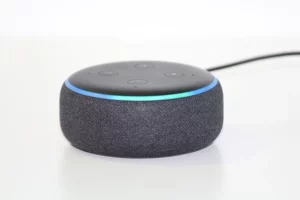Owning a smart voice assistant like the Amazon Echo is truly beneficial, thanks to the myriad of smart home features it offers. However, at times, it may unexpectedly ‘awaken’ and emit random noises or sounds without any apparent reason. On occasion, these sounds may resemble authentic notifications, even though there is no legitimate cause for the notification. Conversely, other times, the noise seems odd and appears to be a clear error. But why does this peculiar behavior occur?
Numerous factors contribute to the Echo’s sporadic playback of sounds. One plausible explanation is that the device mistakenly interprets ambient speech or sounds as the wake word “Alexa,” prompting it to respond unintentionally. Another potential cause could be related to device malfunctions or technical issues within the Echo itself.
To investigate and potentially resolve the issue, you can delve into several plausible causes, as we will explore below.
Random Noises Made by the Amazon Echo
Based on user experiences and information gathered from various sources, it appears that Alexa can produce a diverse range of peculiar and sometimes eerie sounds, which include:

- A “creepy laugh” that some users have described as “evil” sounding.
- Static or feedback-type noises reminiscent of old radios and TVs.
- Occasional “beep” or “boop” sounds.
- Unexpected “whistling” sounds.
- A “ringing” sound similar to a phone call being received, despite no call being set up.
- Chiming sounds.
- A mysterious train sound that has left users perplexed, with a YouTube video even capturing this enigmatic noise.
Addressing these random and sometimes unsettling occurrences is essential. Let’s delve into some of the most common reasons behind these sounds and, more importantly, explore potential ways to prevent or stop them.
- False Wake Word Detection: Alexa may mistakenly detect the wake word (“Alexa”) due to ambient noises or similar-sounding words, leading to unintended responses or sounds. To mitigate this, consider changing the wake word to reduce false activations.
- Interference or Network Issues: Static or feedback-like noises could be the result of network interruptions or interference with the Echo’s communication. Ensuring a stable internet connection and placing the device away from potential sources of interference may help.
- Notifications and Reminders: Some sounds might be actual notifications or reminders set up in the Alexa app or connected services. Review your notification settings and disable any unwanted alerts.
- Software Glitches: Infrequent software glitches or bugs in the Alexa system could trigger unusual noises. Keeping the device and Alexa app updated with the latest firmware and software versions might resolve such issues.
- Voice Purchasing Confirmation: If you have voice purchasing enabled, Alexa may make a sound after processing a voice command related to shopping. You can disable this feature if it bothers you.
- Device Hardware Problems: In some cases, hardware malfunctions within the Echo device itself could lead to odd noises. If you suspect this to be the case, consider contacting Amazon support for assistance.
- Skills and Third-Party Apps: Certain skills or third-party applications might produce unexpected sounds. Review your installed skills and disable any that might be causing the problem.
By exploring these potential reasons and applying appropriate solutions, you can aim to minimize or eliminate the occurrence of these random and sometimes unsettling sounds from your Amazon Echo.
How to Stop Alexa From Making Random Noises?
When your Amazon Alexa starts making weird or unexpected noises, there are several steps you can take to investigate and potentially resolve the issue. Here are some useful methods to explore:

- Ask Alexa Directly: If you encounter an unexpected noise, you can directly ask Alexa about it. In certain regions like the United States and the United Kingdom, you can say, “Alexa, what just happened?” or “Alexa, why did you say that?” to get an explanation for the noise. Although this method might provide insight into common reasons for random sounds, it may not cover more unusual causes.
- Double-Check for Paired Devices: Sometimes, strange noises may be due to a previously paired Bluetooth device that is still connected in the background. To rule out this possibility, say “Alexa, disconnect.” If a paired device is connected, Alexa will inform you and disconnect from it. Otherwise, it will let you know that there are no Bluetooth devices to disconnect.
- Review Alexa Voice Recording History: The Alexa app offers a valuable feature that allows you to review the voice history, showing every recorded interaction with Alexa. By accessing the app’s settings, selecting “Alexa Privacy,” and then clicking “Review Voice History,” you can examine all the recorded commands and interactions. This can help identify potential misinterpretations or background noises that triggered the unexpected sounds.
- Check Alexa Activity: Within the Amazon Alexa app, you can access the “Activity” section to view a log of all actions and responses recorded on your Echo devices. This log includes activities like alarms, timer settings, music playback, and more. By analyzing the activity log, you might discover unexpected actions that could be the cause of the strange noises.
By following these steps and investigating the data provided by the Alexa app, you can gain valuable insights into the causes of the random sounds. Identifying misinterpretations, paired devices, or unusual activities can help you address the issue and potentially prevent further strange noises in the future.
Check if “Brief Mode” Or “Whisper Mode” Isn’t Enabled
When using Alexa, some people find her pre-answer information too long-winded and wish for a more streamlined experience like the Google Home device. To achieve this, you can enable “Brief Mode,” which reduces the amount of pre-chatter and replaces it with beeps or sounds to confirm that Alexa heard you. While these beeps and chimes are helpful, they might come across as weird or random noises if you didn’t enable this option yourself.

Similarly, you might not want Alexa to respond loudly, especially at night when there’s a child sleeping in the adjacent room. In such cases, you can enable “Whisper Mode,” which prompts Alexa to respond in a whisper when she thinks you’re whispering to her. However, if Alexa mishears your request as a “whisper,” her reply may sound odd and somewhat random, potentially contributing to the random sound issues you’re experiencing.
To enable or disable Brief Mode and Whisper Mode, follow these steps:
- Click the menu in the top left corner of the Alexa app.
- Go to “Settings.”
- Scroll down to the “General” section.
- Select “Alexa Voice Responses.”
- Here, you’ll find the options for Brief Mode and Whisper Mode.
If either of these modes is enabled, try disabling them and observe your Echo device for a few days. If the random noises disappear, one of these modes could be the cause of the issue. Adjusting these settings can help create a more personalized and less disruptive interaction with your Alexa device.
Wrapping it up: Additional Checks
The previously explored five factors cover the majority of random noises experienced by Amazon Echo owners. However, if you are still encountering unexpected sounds, consider the following additional checks:
- Check Installed Skills: Verify if you have any third-party Skills enabled on your Alexa. These add-ons may activate based on specific wake-up commands. Say “Alexa, what skills do I have enabled?” to get the list of installed skills, and then say “Alexa, disable [skill name]” to uninstall or disable a skill that might be causing the issue.
- Observe Light Ring Color: Pay attention to the color of the light ring on your Echo when you hear an unexpected noise. Different colors can indicate different situations, such as a pulsing yellow light suggesting a notification or violet/orange colors possibly indicating Wi-Fi or network problems, which could trigger sounds.
- Popping/Crackling Noise: If you hear a popping or crackling sound, it might be a genuine defect in your Echo device, such as a loose power or speaker cable internally. First, ensure that the wall socket works fine with other devices, then check that the Echo power cable is securely plugged in. If the issue persists, consider restarting the device and, if necessary, contact Amazon customer services.
- Software Bug: Occasionally, random sounds might result from software bugs in Amazon’s code. If you encounter a new unexpected noise, perform a Google search to see if others have experienced the same issue recently. It might be a temporary glitch.
- External Interference: Like any speaker, Echo devices can pick up external interference, especially radio signals. A slightly loose connection in the internal speaker(s) of your Echo could also cause radio interference. If you suspect interference, try moving the device or checking for any loose connections.
- Factory Reset: As a last resort, consider doing a factory reset of your Echo device. Amazon provides detailed help pages for resetting each Echo model. Keep in mind that a factory reset will reset local Echo settings, but app-controlled features like “Brief Mode” will not be affected.
- Contact Amazon Customer Support: If all else fails, reach out to Amazon customer support. Explain the steps you’ve taken and inquire if your device needs replacing due to potential defects. Amazon is generally responsive in addressing product issues.
By following these additional steps, you can further investigate the source of the random noises and work towards resolving the problem.
You May Also Enjoy Reading: Does Amazon Echo have an AUX input?
